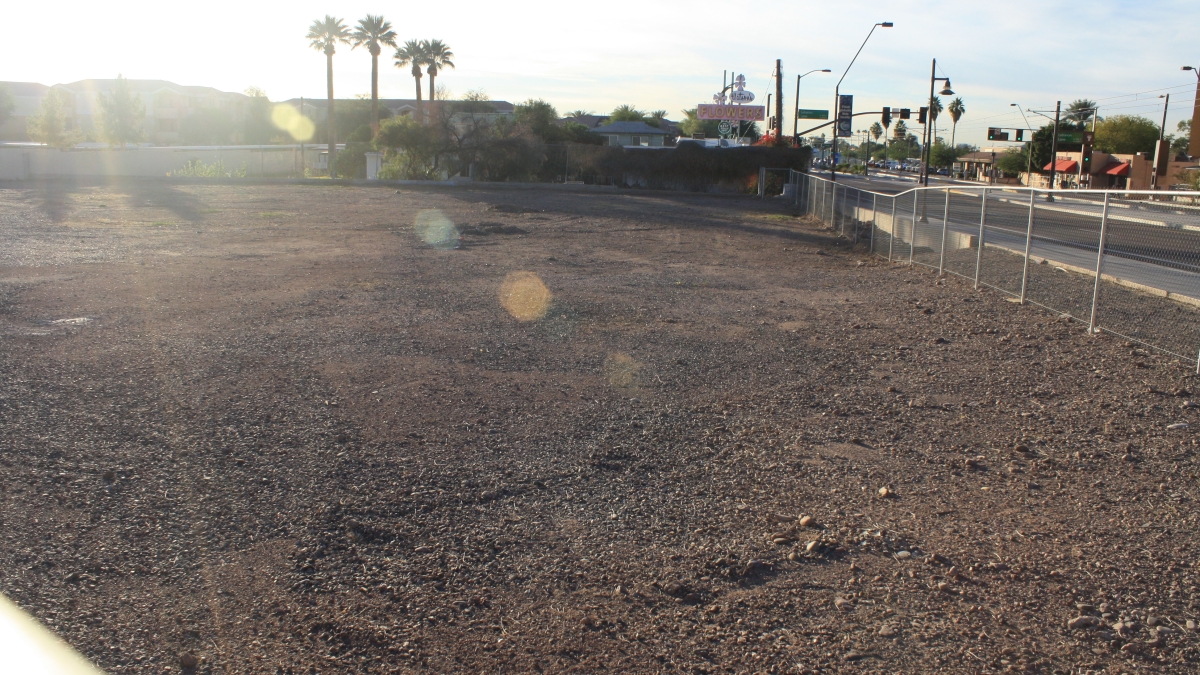Arizona Forward to build on ASU student investigation of vacant-land development opportunities

In fall 2012, students in Placemaking & Community Building, a combined senior/graduate level ASU urban planning course, took on a cooperative project with Valley Forward, a key leadership organization in the Phoenix area. The project focused on identifying development scenarios for vacant parcels in the Phoenix area’s light rail corridor. After a presentation of the study’s results this spring, the leadership group (recently renamed Arizona Forward) has decided to use the students’ work as the starting point for a white paper and toolkit aimed at supporting realization of the vision for converting vacant parcels in metropolitan Phoenix into more constructive spaces.
Arizona Forward's Land Use & Open Space Committee acknowledged the work of course instructor Dean Brennan, teaching assistant Hannah Szabo, and all students in the course, especially Julia Kerran and Will Heasley, who developed and presented the project’s results to the committee.
“Temporary development creates a use for locations that can otherwise become a source of blight, filling in empty space and fostering creative ideas as well as promoting community activities,” explains Brennan, an ASU faculty associate and planning professional.
Temporary development opportunities, known as TDO’s, can be anything from food truck courts to art and water features; but they share the characteristic of being easy to establish in a vacant parcel, with an expectation of being removed when a permanent use for the parcel is identified.
At the outset of the project, Valley Forward approached three cities – Mesa, Tempe and Phoenix – and each city recommended several sites that they would like students to focus on. Teams of students each focused on a single city. Initially, each student observed and documented his or her site at different times of day. After presentations to the Valley Forward group, and by city representatives, each student team identified a single site for its focus. To develop TDO recommendations for their sites, students studied locations elsewhere in the US with successful temporary developments, researched each city’s existing intentions for the site and its surroundings as identified by the city’s general plans and zoning, and considered environmental issues, site limitations, and best practices learned from existing TDOs.
The students’ work resulted in site concepts for each of the sites in the city. However, beyond that, the final report also includes recommendations for transforming ideas for TDOs into reality – including key steps such as identifying funding sources, and strategies for protecting private owners of the vacant parcels from liability and concerns about adverse possession.
“It's very exciting to have a group with the credibility of Valley Forward (now Arizona Forward) use the work of students to initiate a major community project that will potentially have wide reaching impacts throughout the Phoenix metro region,” comments Brennan.
“In fall 2013, we’ll teach this course again, following the same approach,” adds Brennan. “Next fall, students will focus on neighborhood revitalization projects that will help create a sense of place and help build community in Phoenix’s Gateway and Eastlake/Garfield districts.” The student’s efforts will contribute to Reinvent Phoenix, a collaborative partnership between the City of Phoenix, the U.S. Department of Housing and Urban Development, Arizona State University, St. Luke’s Health Initiatives, and several other local organizations.
Valley Forward, now Arizona Forward, is a nonprofit that advocates for regional cooperation and connectivity. Its members represent large corporations and small businesses, municipalities and government agencies, educators, non-profits and concerned individuals working together on environmental initiatives.
Placemaking and Community Building, currently numbered PUP 494/591, is offered each fall by the School of Geographical Sciences and Urban Planning, an academic unit of the College of Liberal Arts and Sciences.